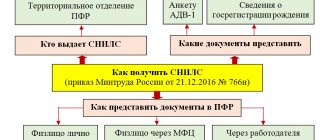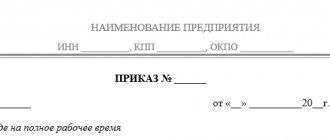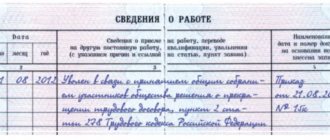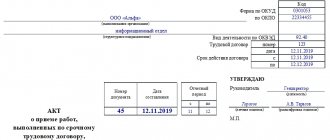The probationary condition is not mandatory, but an additional clause in the content of the employment contract, along with such conditions as additional non-state pension provision for the employee, additional insurance for the employee, non-disclosure of legally protected secrets and others that are specified in Art. 57 Labor Code of the Russian Federation. Therefore, if this condition is not included in the employment contract, then the employee is considered hired without testing.
If an employee is actually allowed to work without drawing up an employment contract, the probationary clause can be included in the employment contract only if it is drawn up as a separate agreement before starting work (Article 70 of the Labor Code of the Russian Federation).
To whom the employer does not have the right to establish a probationary period
Such categories of workers are indicated in Part 4 of Art. 70 Labor Code of the Russian Federation:
- candidates under 18 years of age;
- pregnant women, as well as women with children who are under 1.5 years old;
- elected through a competition to fill the relevant position;
- those elected to elective positions for paid work;
- employees entering into an employment contract for a period of up to two months;
- people who were invited to work as a transfer from another employer by agreement;
- those who have successfully completed their apprenticeship;
- persons with secondary vocational education or higher education who received it through accredited educational programs, entering work for the first time in their specialty within one year from the date of receipt of the relevant education.
How long can a probationary period be?
The duration of such a period may be determined by the employer by agreement with the employee. However, labor legislation provides for a maximum period for a specific category of workers.
There is a certain rule: it is possible to make the period shorter than what is specified by law, but it is impossible to set the period longer or extend it.
It is also worth considering that the probationary period does not count periods when the employee was actually absent from work, in particular, the period when he was on sick leave.
Letter of Rostrud dated 04/25/2011 No. 1081-6-1 provides an explanation as to why it is not necessary to count into the probationary period periods when an employee is on short-term leave without pay or on leave in connection with training, performing state or public duties and absence without good reason (for example, absenteeism). The department proceeds from the fact that the workplace, as specified in Part 6 of Art. 209 of the Labor Code of the Russian Federation, is the place where the employee must be in connection with his work and which is controlled by the employer directly or indirectly.
Is it then possible to consider a business trip a period that, like all those listed above, should not be included in the probationary period? Rostrud believes that business trips should be included, citing the following arguments. On the one hand, the employee is traveling away from his permanent place of work. On the other hand, he is sent there by the employer for a specific purpose - to perform the labor function provided for by the employment contract.
Letter of Rostrud dated 04/25/2011 No. 1081-6-1 also notes that after the break the probationary period continues, but its total duration before and after the break should not exceed the period specified in the employment contract.
| Category of workers | Maximum probationary period |
| Managers and their deputies, chief accountants and their deputies, heads of branches and representative offices | 6 months |
| Employees whose employment contract is concluded for a period of 2 to 6 months | 2 weeks |
| "Ordinary" workers | 3 months |
What if an employee refuses to take the test?
Some applicants dismissed at the end of the probationary period, when appealing against the employer’s actions, indicate that they did not consent to the establishment of a test when hiring.
The question is quite sensitive. If the applicant refuses to take the test, he will not get the job. But the employer’s refusal may be regarded as unfounded, and the applicant will try to prove through the court that, despite the provided diplomas, certificates, letters of recommendation, results of previous work confirming his competence, skill and professionalism, the employer illegally demanded that he also pass a test. The employer will have to argue for the importance of practical confirmation of the applicant’s business qualities. However, if there were several applicants for the vacancy, the employer will be able to prove that he liked the business qualities of another candidate who was ready to pass the test more.
Igor Dudoladov , head of the department of supervision and control for wages of the Federal Service for Labor and Employment, in an interview[3] indicated that the employer does not have the right to establish a test without the consent of the employee . Article 70 of the Labor Code of the Russian Federation states that a probationary condition may be provided for in an employment contract not by the decision of the employer, but by agreement of the parties. If the applicant has signed an employment contract that includes a probationary clause, then such an agreement has been reached.
In which documents should the condition regarding the employee's probation be stated?
This condition is included in the employment contract or in a separate agreement. And the employer has the right to establish it only before the person is actually allowed to work and with the latter’s consent.
Rostrud recommends using the following wording: “This contract/agreement provides for a probationary period with a probationary period of 3 (three) months.”
The employment contract or agreement is signed in two copies. One is for the employee and the other is for the HR department. It is better to stitch and number the employment contract. This is necessary in case the dismissed employee does not have the opportunity to talk about the employer replacing the sheets of the contract.
The probationary period condition is also stated in the text of the order, which is issued on the basis of the employment contract.
The employer must maintain a work book for an employee who is on a probationary period. In Art. 66 of the Labor Code of the Russian Federation specifies that “the employer (with the exception of employers - individuals who are not individual entrepreneurs) maintains work books for each employee who has worked for him for more than five days, in the case where work for this employer is the main one for the employee.”
To understand whether a newcomer is suitable for the position for which he is applying, you need to monitor the results of his activities throughout the probationary period, demand reports from him, and record shortcomings.
A final decision on compliance can be made before the probationary period expires.
Passage result
The report records the result of the employee's suitability assessment. It can serve as a legitimate justification for dismissal. If the parties reach an agreement, no report is required.
Satisfactory
If the new employee has passed a professional test and is suitable for the position, copes well with tasks, has no conflicts with colleagues and the management of the enterprise, a decision is made to extend the employment relationship. The previously signed agreement remains unchanged and without additional notes.
Unsatisfactory
If the position is not suitable, the employee may be dismissed. It doesn’t matter whether the probationary period has ended or not: you can fire without waiting for its end. To terminate an employment relationship, it is enough to give the employee a notice of termination of his work in the organization 3 working days in advance. In this case, it is better to indicate the entire list of requirements that the employee does not meet - this will help to avoid further proceedings in the supervisory authorities. In this case, upon dismissal, the person does not receive severance pay. The reason for dismissal in accordance with the requirements of the law is indicated in the order and work book.
Salary for probationary period
Since Part 3 of Art. 70 of the Labor Code of the Russian Federation establishes that during the probationary period the employee is subject to all norms of labor legislation, then passing the test cannot be considered as a basis for reducing its size. Moreover, if there are no provisions prescribing a special procedure for calculating wages during this period.
But the law does not directly prohibit reducing an employee’s salary due to the completion of a probationary period. Therefore, it is common practice for employers to do just that.
How to schedule a test correctly
The main document stipulating the test and its duration is the employment contract.
What if you don’t sign an employment contract for the probationary period?
Some employers prefer not to enter into an employment contract with “trainees” undergoing testing, reasoning that if there is no document, there are no problems with dismissal. If the employee proves that he had an employment relationship with this employer, he can be hired on a permanent basis or receive all the required compensation. The fact of the existence of an employment relationship is proven by testimony and internal documents of the organization. Let us consider as an example the appeal ruling of the Supreme Court of the Republic of Tatarstan dated August 17, 2014 in case No. 33-9466/2014 .
The employee was hired on a probationary period of three months in November 2013, but submitted her resignation at her own request a month later, before the end of the probationary period. The employer did not provide the employee with a work book or salary, and she went to court. In court, the employer stated that the woman was not employed because she was undergoing training.
However, the court considered such actions of the employer to violate labor law norms, since, having examined the evidence, it came to the conclusion that the plaintiff was actually allowed to perform her job duties: within a month she acquired skills and became familiar with the peculiarities of the profession, mastered the requirements presented by management, negotiated, introducing herself on behalf of the company, she was allowed to access the personal data base. Witnesses testified that the woman was in the office from November to December 2013 full-time, she was provided with a desk and a computer, and at the request of management, employees trained her to work in the 1C:Enterprise 8.2 program.
In addition, the circumstances of the actual admission to work were confirmed by the plaintiff’s statement addressed to the manager, in which she asked to be given administrative hours to visit a doctor. This statement was agreed by management. The application for voluntary resignation accepted by the employer also served as evidence of the existence of an employment relationship. The employee’s claims, including compensation for moral damages, were satisfied.
In addition, failure to conclude an employment contract with an employee allowed to work is regarded as a violation of labor laws, as a result, the employer risks getting even more problems than benefits. There is no employment contract - there is no employee liability to the employer, for example, in case of damage to property or disclosure of trade secrets. It will be difficult for an employer to ask a newcomer to the fullest extent of the law, since, in fact, he is not an employee of the organization.
Is it possible to conclude a fixed-term contract with an employee during the trial period?
Other employers try to avoid the hassle of dismissal by initially concluding a fixed-term contract with the new employee, which does not include a probationary period. Perhaps such employers forget that Art. 58 of the Labor Code of the Russian Federation prohibits the conclusion of fixed-term employment contracts in order to evade the provision of rights and guarantees provided to employees with whom an employment contract is concluded for an indefinite period. An employee can prove through the court that the case of concluding a fixed-term employment contract with him is not included in the list of cases specified in the Labor Code of the Russian Federation.
According to paragraph 13 of the Resolution of the Plenum of the Supreme Court of the Russian Federation No. 2 [4], if the court, when resolving a dispute about the legality of concluding a fixed-term employment contract, establishes that it was concluded by the employee under force, the court will apply the rules of a contract concluded for an indefinite period . That is, the employee will begin to perform his official duties and will be considered accepted for permanent work without establishing a probationary period.
If the order does not contain a provision for testing?
When preparing documents for employment, you do not need to include a test condition in the work book. But this condition should be indicated in the employee’s order and application for employment. However, if a probationary condition is in the employment contract and the document is signed by the employee, the absence of this condition in the order or application is not critical. Example - Appeal ruling of the Vologda Regional Court dated April 11, 2012 No. 33-1250/2012 . The employee was hired by the organization as an accountant, but was subsequently dismissed under Part 1 of Art. 71 of the Labor Code of the Russian Federation due to an unsatisfactory test result. Considering the dismissal illegal, she filed a lawsuit for reinstatement at work, recovery of wages and compensation for moral damage, pointing out, in particular, that the employment order did not contain a condition of probation.
However, in the contract that the plaintiff signed, there was a test clause. The court indicated that according to Part 1 of Art. 68 of the Labor Code of the Russian Federation, the content of the employment order must comply with the terms of the concluded employment contract. However, the absence of a mention in the order of establishing a trial does not invalidate a similar condition of the employment contract, and the employee, when signing it, agreed to the condition of the probationary period. Therefore, the argument about the absence of an indication of testing in the order was found by the court to be unfounded.
What if a newcomer started work before concluding an employment contract?
An employment contract must be concluded with the employee no later than three working days from the start of his work ( Article 67 of the Labor Code of the Russian Federation ). If a newcomer began work with the knowledge or on behalf of the employer or his authorized representative, then the employment contract, even if not drawn up in writing, is still considered concluded ( Article 67 of the Labor Code of the Russian Federation ). In this case, the probationary condition can be included in the employment contract only if the parties formalized it in the form of a separate agreement before the employee began working ( Article 70 of the Labor Code of the Russian Federation ). There is no separate agreement - the employee is hired without testing. Example - Appeal ruling of the Moscow City Court dated 09/04/2014 in case No. 33-30170 .
Considering the dismissal due to an unsatisfactory test result illegal, the employee went to court. The employee was given a probationary period by order. However, an employment contract was not concluded with her, and a separate agreement providing for a probationary condition was not signed by the parties. The court came to the conclusion that the employee was hired without a test and her dismissal was under Part 1 of Art. 71 of the Labor Code of the Russian Federation is illegal.
The court did not accept the employer’s arguments that the probationary condition was provided for in the hiring order as a basis for refusing to satisfy the claim, pointing out that by virtue of Part 1 of Art. 68 of the Labor Code of the Russian Federation, employment is formalized by an order (instruction) of the employer, issued on the basis of a concluded employment contract. The order, including the establishment of the probationary conditions, must comply with the terms of the employment contract. However, the employee began to perform her duties without concluding an employment contract, which means that the probationary clause in the order is not valid.
Rostrud, in Letter No. 642-6-1 dated March 11, 2010, also draws attention to the fact that the absence of a test clause in the employment contract means that the employee was hired without a test ; it is impossible to dismiss him as having failed the test.
What to do if the employee has not passed the probationary period
In this case, the following algorithm of actions is useful:
- Prepare a reasoned conclusion (documentary evidence) that the employee did not pass the test. This is necessary in order to terminate the employment contract with the employee on its basis.
- Three days before dismissal, inform the employee of your plans in writing. To do this, prepare a notice of unsatisfactory test results in two copies (one will need to be given to the employee, and the other one will need to be kept, with the employee’s signature on it). In this document, it is not enough to simply indicate the reasons for termination of the employment contract, but also to confirm them with references to evidence documents: acts, orders to impose penalties, explanatory notes, customer complaints, etc.
- Having received a receipt from the employee for receipt of notice of dismissal, you need to issue an order to terminate the employment contract. Further, the process is no different from the usual dismissal of an employee. In the work book, do not forget to make an appropriate entry stating that the employment contract was terminated due to an unsatisfactory test result, part 1 of Art. 71 Labor Code of the Russian Federation.
It is worth considering that the employer cannot terminate the employment contract if he is dissatisfied with the results of the test related to the violation of acts with which the employee was not familiarized with signature. Among such documents:
- job description;
- internal labor regulations;
- other local regulations directly related to the employee’s work activity.
Who should not be tested?
Article 70 of the Labor Code of the Russian Federation defines a list of persons for whom the employer does not have the right to impose a test upon hiring . This:
- elected through a competition to fill the relevant position;
- pregnant women and women with children under the age of one and a half years;
- under 18 years of age;
- those entering work for the first time in their acquired specialty within a year from the date of receiving vocational education of the appropriate level in educational programs that have state accreditation;
- those elected to elective positions for paid work;
- invited to work by way of transfer from another employer by agreement;
- concluding an employment contract for a period of up to two months.
The prohibition on setting up a test when hiring is also contained in Art. 207 of the Labor Code of the Russian Federation : for persons who have successfully completed an apprenticeship, when concluding an employment contract with the employer under the contract with whom they underwent training, no test is established. This norm is also stipulated in other federal laws and regulations .
For example, a probationary period is not established for a person who has successfully completed sports training on the basis of an agreement for the provision of sports training services, when concluding an employment contract with the customer for sports training services[1] or for a citizen undergoing alternative civil service[2]. If the employer did not know about the presence of factors prohibiting the establishment of a test for the employee?
If an employer establishes a hiring test for the listed category of persons, then such a condition cannot be recognized as legal, even if there is the written consent of the applicant to undergo the test. If the test result is unsatisfactory, the employer is still obliged to hire such an employee for permanent employment. In case of refusal, the employee can go to court and win the case. The employer did not know that the employee being hired had a child under one and a half years old, and included a probationary clause in the contract? This means that this condition is invalid. If an employee hid this fact when she started working, her rights still remain under the protection of labor legislation, and it is impossible to fire her for failing to pass the test!
Let's consider the appeal ruling of the Smolensk Regional Court dated September 23, 2014 in case No. 33-3145 . When applying for a job, the employee hid from the employer the fact that she had a child under the age of one and a half years, so she was given a test. Subsequently, the employer fired her under Art. 71 of the Labor Code of the Russian Federation as having failed to fulfill its responsibilities. However, the young mother, through the court, restored her rights as a permanent employee and received compensation for forced absenteeism.
The employer's arguments that the woman hid from him the presence of a young child, and therefore her actions constituted an abuse of right, were found by the court not to be based on the law that established the prohibition of restricting rights or establishing direct or indirect advantages when concluding an employment contract ( Article 64 Labor Code of the Russian Federation ). Therefore, these arguments were not regarded as an abuse of the plaintiff’s right and did not lead to the cancellation of the lawful decision.
So, from the literal interpretation of the norms of paragraph. 2 hours 4 tbsp. 70 of the Labor Code of the Russian Federation, the effect of the provision banning testing for women who have a child under one and a half years old does not depend on the awareness of the employer. The court indicated that in this regard, the fact that the plaintiff did not inform the employer about the presence of the child, as well as whether the employer was or was not aware of this, has no legal significance and cannot influence compliance with the guarantees provided for by law.
Should a probationary period be established for single fathers raising young children?
Sometimes employers have a question: should they establish a probationary period for single fathers raising children under one and a half years old? After all, the Labor Code of the Russian Federation contains a ban that applies only to mothers. The rights of single fathers are protected by clause 9 of the Resolution of the Plenum of the Armed Forces of the Russian Federation dated January 28, 2014 No. 1 “On the application of legislation regulating the work of women, persons with family responsibilities and minors” , according to which it is prohibited to establish a test when hiring pregnant women, women with children under the age of one and a half years, also applies to other persons raising children under the age of one and a half years without a mother . If such employees have been assigned a test, then termination of the employment contract with them based on the results of the test is not allowed.
Is the probationary period included in the length of service that gives the right to leave?
The right to annual paid leave for the first year arises only after six months of continuous work with a specific employer (Article 122 of the Labor Code of the Russian Federation). The vacation experience includes the time of actual work. And during the probationary period, the employee is subject to all provisions of labor legislation and local regulations.
Since the probationary period is not included among those periods that are not taken into account when calculating the length of service for the provision of paid leave (Article 121 of the Labor Code of the Russian Federation), it turns out that this period is included in the length of service for leave.







